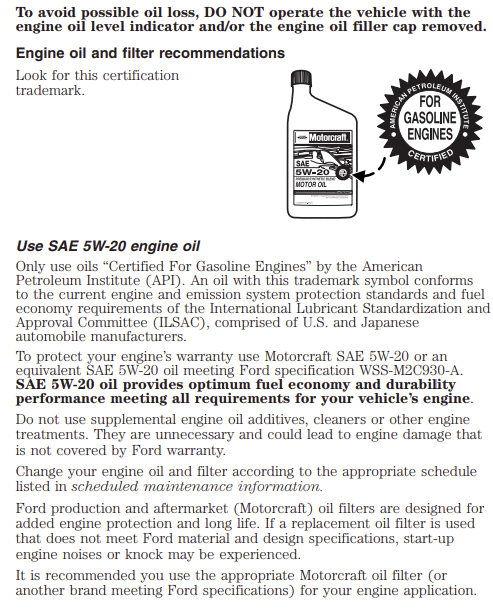The Ford F150 has been a cornerstone of American motoring for decades, standing strong as a symbol of resilience, power, and reliability. In particular, the 2006 Ford F150 remains a stalwart example of the quality and durability the Ford Motor Company has consistently delivered.
With its robust architecture and diverse engine options, this pickup truck is designed to handle both everyday tasks and strenuous hauling with equal poise and dependability.
But to continue performing at its best, your 2006 Ford F150 requires meticulous care, with one crucial aspect of maintenance being the use of the correct oil type. Engine oil plays multiple roles in your vehicle, from lubricating moving parts to prevent friction and wear, to cooling engine components, inhibiting corrosion, and even helping clean engine surfaces.
The right type of engine oil is a key element in your truck’s health, affecting everything from engine longevity to fuel efficiency. Using the correct oil type for your specific vehicle ensures that the engine runs smoothly, performs optimally, and stays healthy for the long run.
It safeguards your vehicle against premature wear and possible engine damage, making it a fundamental part of your vehicle’s regular maintenance.

What Kind Of Oil Does A 2006 Ford F150 Take?
The 2006 Ford F150 is designed to use Motorcraft SAE 5W-20 Premium Synthetic Blend Motor Oil. This specific oil type is recommended by Ford and conforms to Ford’s specification WSS-M2C930-A.

It’s important to ensure that any oil you use is “Certified For Gasoline Engines” by the American Petroleum Institute (API) and, ideally, should also meet the fuel economy requirements of the International Lubricant Standardization and Approval Committee (ILSAC), which is comprised of U.S. and Japanese automobile manufacturers.
Understanding Engine Oil
Engine oil plays a crucial role in the smooth and efficient operation of any vehicle. Its primary function is to lubricate the engine’s internal parts to reduce friction, which, in turn, minimizes wear and tear and prevents overheating. Besides lubrication, engine oil also serves as a coolant by transferring heat away from the combustion cycle.
Furthermore, it helps to clean the engine by suspending dirt particles and contaminants to prevent them from settling in the engine. It provides a protective layer that helps prevent corrosion of engine parts. Thus, choosing the right engine oil can significantly impact the performance, fuel efficiency, and lifespan of your vehicle.
Different Types of Engine Oil: Conventional, Synthetic, and Synthetic Blend
There are primarily three types of engine oil: conventional, synthetic, and synthetic blend.
- Conventional Oil: This is the standard engine oil, refined from crude oil. It provides all the essential functions of engine oil at a reasonable cost. However, conventional oil breaks down more quickly under extreme temperatures and doesn’t offer the same level of protection or efficiency as synthetic oil.
- Synthetic Oil: This oil is chemically engineered in a lab. It has fewer impurities than conventional oil and provides superior mechanical and chemical properties. Synthetic oil flows better in cold weather, maintaining good lubrication, and doesn’t break down as quickly under high heat or extreme pressure. However, synthetic oil is more expensive.
- Synthetic Blend Oil: As the name suggests, synthetic blend oil is a mix of conventional and synthetic oils. It provides better protection and performance than conventional oil, especially in severe driving conditions, but is less expensive than full synthetic oil.
Explaining Oil Viscosity and Its Importance
Viscosity refers to the thickness of the fluid. For engine oil, it’s a measure of how easily it flows at different temperatures. Viscosity ratings in oil types, like 5W-20, are given as a two-part number. The first part (5W, in this case) indicates the oil’s viscosity at low temperatures (W stands for winter), while the second part (20) shows the oil’s viscosity at high engine operating temperatures.
Lower viscosity oils (like 5W-20) flow more quickly at low temperatures, providing faster engine protection when you start your vehicle. At high temperatures, the oil maintains its thickness, ensuring a consistent protective layer around engine components.
The viscosity rating recommended by the vehicle’s manufacturer is selected to provide the best balance of engine protection, fuel efficiency, and performance across a wide range of conditions. So, for your 2006 Ford F150, Ford recommends using SAE 5W-20 oil, specifically Motorcraft SAE 5W-20 Premium Synthetic Blend Motor Oil.
Choosing the Right Oil for Your 2006 Ford F150
When choosing the right oil for your 2006 Ford F150, several factors come into play:
- Driving Conditions: The type of driving you do significantly impacts your oil choice. If you frequently drive in stop-and-go traffic, on dirt roads, or tow heavy loads, a full synthetic oil or synthetic blend, like the recommended Motorcraft SAE 5W-20 Premium Synthetic Blend Motor Oil, can provide better protection against wear.
- Climate: The climate where you live also plays a significant role. Lower viscosity oils, like 5W-20, flow better in colder temperatures, making them suitable for regions with harsh winters. Higher viscosity oils are more resistant to thinning in hot conditions.
- Towing Requirements: If you frequently tow heavy loads with your F150, synthetic oil can provide better protection against the additional heat generated by the engine under these conditions.
Recommended Oil Type and Specification
According to the owner’s manual, the 2006 Ford F150 requires Motorcraft SAE 5W-20 Premium Synthetic Blend Motor Oil. This oil has been formulated to provide optimal lubrication and protection for your F150’s engine. It also meets Ford specification WSS-M2C930-A, ensuring it provides the necessary performance for your vehicle.
How Much Oil Does A 2006 Ford F-150 Take?
The oil capacity, including the oil filter change for the 2006 Ford F150, varies based on the engine type:
- 4.2L engine: The capacity is 6.0 quarts (5.7L).
- 4.6L engine: The capacity is 6.0 quarts (5.7L).
- 5.4L engine: The capacity is 7.0 quarts (6.6L).
Ensure to always check the oil level with the dipstick after refilling to avoid overfilling.
The oil used should be “Certified for Gasoline Engines” by the American Petroleum Institute (API). The API certification trademark on the oil container ensures that it meets all the current engine and emission system protection standards and fuel economy requirements of the International Lubricant Standardization and Approval Committee (ILSAC), which includes U.S. and Japanese automobile manufacturers.
Oil Filter Recommendations
Ford recommends using Motorcraft oil filters or another brand that meets Ford’s specifications. Using a non-compliant oil filter can result in start-up engine noises or even knocking.
Recommended Oil Change Intervals
The recommended oil change intervals can be found in the vehicle’s Scheduled Maintenance Guide. Regular oil changes are crucial to ensure the longevity and optimal performance of your vehicle’s engine. Please adhere to the manufacturer’s recommendations regarding oil change intervals, as failure to do so can lead to engine damage not covered by the warranty.
What Oil Does A 06 Ford F150 5.4 Take?
The 2006 Ford F150 with a 5.4L engine requires Motorcraft SAE 5W-20 premium synthetic blend motor oil, according to the owner’s manual. This oil is specially designed to offer optimum performance, fuel economy, and engine protection.
It’s worth noting that the oil you use should be “Certified For Gasoline Engines” by the American Petroleum Institute (API) and should meet Ford specification WSS-M2C930-A.
Also, keep in mind that the oil capacity for the 5.4L engine is 7.0 quarts (or approximately 6.6 liters), including the oil filter change.
Remember, the use of supplemental engine oil additives, cleaners, or other engine treatments is discouraged as they are unnecessary and could lead to engine damage not covered by the Ford warranty.
Always ensure to use an appropriate Motorcraft oil filter (or another brand meeting Ford specifications) for your engine application.










